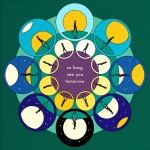It’s hard to classify Bombay Bicycle Club given its penchant for continuously altering its musical style. The band’s catalogue, spanning four albums, already contains a guitar-heavy indie rock album, “I Had the Blues but I Shook Them Loose,” a folk-inspired acoustic record, “Flaws,” and the up-tempo “A Different Kind of Fix.”
Whether or not the radical change from album to album is a testament to the band’s versatility or an indictment of its lack of identity, Bombay Bicycle Club nonetheless continues the trend with “So Long, See You Tomorrow,” an album that clearly finds its inspiration in electronic music.
Jack Steadman, the lead singer, also acts as producer for the album. It is his first full-length attempt at production, and the band’s first attempt at producing an album entirely in-house.
As such, the music is heavily inspired by the time Steadman spent in between “A Different Kind of Fix” and “So Long, See You Tomorrow.” Traveling to India, Japan, Turkey and the Netherlands, Steadman returned inspired. “Overdone” and “Feel” are laced with Bollywood-inspired sounds, for example. The result is an album that is more ambitious and more sonically expansive than the band’s previous records.
The album begins with “Overdone.” Strings and drums slowly crescendo before Steadman’s vocals are introduced. As the opening song, it immediately signals the band’s intent. It’s the most dance-ready song Bombay Bicycle Club listeners will have heard, at least until “Feel,” later on in the album.
This upbeat pace continues throughout the album, only slowing down during “Eyes Off You,” which provides a well-needed breather just after the midway point. The first half of the song is not unlike those of post-dubstep Mercury Prize winner James Blake; haunting vocals and minimalist production dominate, until a kick of energy provided by the guitars and drums brings the song back into indie rock territory.
The album’s standout song, “Luna,” is a three-minute microcosm of all of Steadman’s ideas for the album’s production. Present are a tabla, strings and Rae Morris, who duets and complements Steadman’s delicate voice perfectly. Each component of the song adds a different, exciting layer to the overall light atmosphere.
Unlike previous iterations of Bombay Bicycle Club, the 2014 version seems more prepared to explore diverse sounds within an album. While sonically very different, the previous three albums were all tightly woven individual works, choosing a type of song and by and large sticking with it. “So Long, See You Tomorrow,” however, sees the band explore drum patterns, strings and guitars in ways unheard of in previous albums.
Steadman’s obvious penchant for electronic production – he has released entirely electronic works as a solo artist – is also apparent throughout the album: The album’s title track, “Luna” and “Carry Me” all give credibility to Steadman the electronic producer as well as Steadman the singer. Having allowed outside producers to step into the recording studio and engineer the band’s music on previous records, it is interesting to listen to Bombay Bicycle Club at its most experimental with no external influence.
It is only fitting that Steadman, having tried his hand at so many different styles and musical identities, would have to travel the world to find inspiration for such an eclectic range of works in “So Long, See You Tomorrow.” Bombay Bicycle Club 2014 is not the indie rock band that debuted its first album in 2009; it has added panache and culture.
